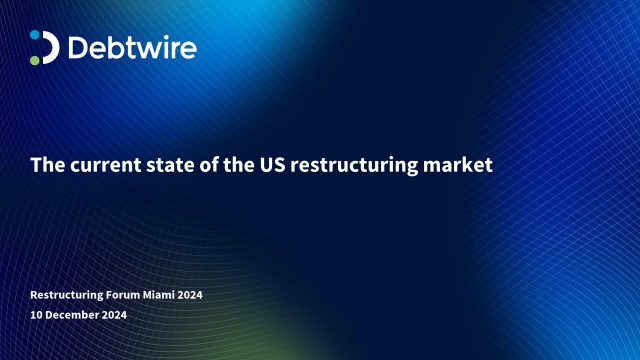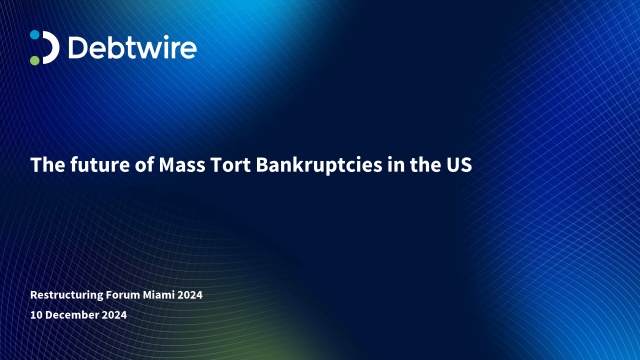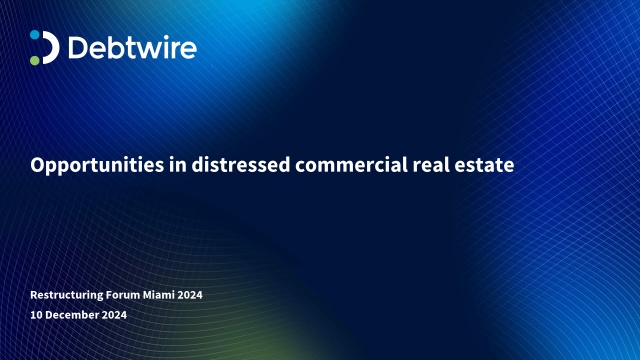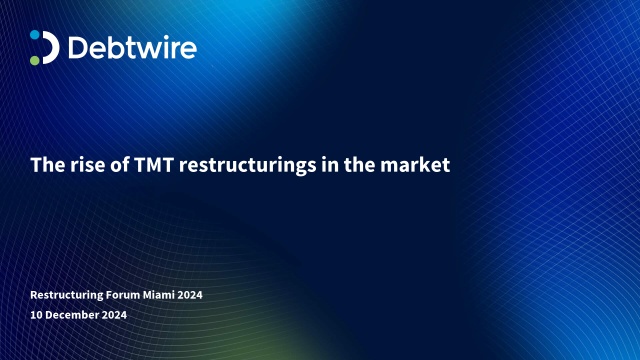Agenda
Breakfast and registration
Opening panel: The current state of the US restructuring market
A higher interest rate environment and continuing macroeconomic pressures fuelled a surge of restructurings in 2023. Whilst these issues persist in 2024, there has been a slowdown in restructuring activity so far. According to Debtwire data, in-court restructuring activity has fallen 32% in the first half of 2024 with 106 cases filed compared to 148 cases in the same period last year. Is this trend set to continue? Our panellists will discuss the opportunities and challenges affecting the North American restructuring market and their expectations for 2025.
- What factors are impacting the number of Chapter 11 filings so far this year, such as an uptick in out-of-court restructurings?
- Macroeconomic outlook: with the expected Fed rate cuts, how will the restructuring market be impacted?
- Will we continue to see a rise in SPAC bankruptcies in 2025?
- How is the deal pipeline shaping up for 2025, and what sectors will continue to see high levels of restructuring activity?
Networking Break
Panel: The evolution of liability management exercises
One of the top trends driving restructuring activity in the past few years has been the increase of sponsors engaging in liability management exercises (LMEs), with companies and investors pursuing restructuring solutions outside of bankruptcy and using Chapter 11 filings as a last resort. Given continued financial headwinds and uncertain economic conditions, this trend is only set to continue as borrowers and sponsors adjust their capital structures. Our panel of experts will unpack the opportunity set and discuss:
- What is prompting the shift towards out of court transactions and LMEs gaining popularity?
- What are some creative out-of-court solutions being used, such as up-tier transactions, drop-downs with unrestricted subsidiaries and double dip LMEs?
- Will the continued impact of LMEs affect how bankruptcies unfold in the coming year?
- Are there situations in which LMEs should be avoided? How can lenders mitigate the risks that LMEs bring about?
Panel: The growing role of private credit in a restructuring context
The private credit market continues to grow, reaching $2.1 trillion AUM globally, with the bulk of the activity coming from the US, where its market share is nearing that of syndicated loans and high-yield bonds. Non-bank direct lending continues to play an important role in the distressed debt space, and private credit firms are increasingly filling in a gap that traditional banking institutions have left behind, due to their speed of execution, certainty of funding, their ability to service high-risk borrowers as well as provide capital solutions to distressed borrowers where existing investors or lenders are unable to do so. Our panellists will discuss:
- Macroeconomic outlook- how are continued market dislocations impacting the direct lending space?
- Are private credit funds increasingly willing and able to support companies throughout the restructuring cycle?
- Will we see an increase in private credit LMEs as borrowers seek to extend runway in a high interest rate environment?
- What are the opportunities and risks that lie ahead?
Networking lunch
Panel: The future of Mass Tort Bankruptcies in the US
The recent Purdue Pharma Supreme Court ruling, which barred the issuance of non-consensual third-party releases in Chapter 11 plans, will have huge consequences for future mass tort cases. Separately, a bi-partisan bill has been introduced seeking to curtail Texas Two-Step bankruptcies, and whilst its passage is not guaranteed, its introduction signals growing scrutiny of corporate bankruptcy tactics and might signal a rise in legislative and judicial focus on these issues. Our panel of experts will unpack the latest updates and discuss the implications of the decision and what it means for Chapter 11 cases going forward.
- Case study: what are the potential ramifications of the Purdue decision for the restructuring industry and the resolution of mass torts?
- Updates on the J&J/LTL Management bankruptcy case- what’s next?
- Is the Texas Two-Step here to stay, or is it losing steam?
- Industry views- what is next for Chapter 11 mass tort cases? How will the industry continue to evolve?
Panel: LatAm restructuring: the road ahead
Latin American in and out-of-court restructurings have continued at an elevated pace in 2024. High interest rates, weakening local currencies and political instabilities across Latin America have created the perfect storm for continued distressed activity in the region, with corporates choosing to restructure domestically and in the US via Chapter 11 and Chapter 15 proceedings. This panel will discuss the state of the market, important legal framework challenges outlooks for sector activity and what’s to come in 2025.
- Macroeconomic outlook- inflation, rising interest rates, maturing debt- how is this impacting the volume of restructurings in the region, and will we see a rise in corporate distress and defaults in 2025?
- Precedent-setting cases in Brazil, Mexico, Chile and Colombia
- How will changes to Mexico's judicial system affect restructurings?
- What are the top sectors turning towards in-court proceedings regionally and in the US?
Networking Break
Panel: Private credit special situations focus: taking the keys
Whilst private credit can provide flexible solutions for borrowers, when distress occurs it can lead to ‘key-taking’ restructurings, where the equity sponsor turns over control of the business to the direct lenders. It is expected that as loans issued in the past few years begin to mature, more asset managers will be swapping their debt for equity and looking to exit their investments. Our panel of direct lenders discuss the outlook and competitive landscape for private credit special situations.
- Will we be seeing an increase of ‘key taking’ restructurings as defaults rise?
- Case study: Pluralsight – what are the impacts of the potential restructuring?
- What special situation opportunities may emerge in the next 12 months?
- How is direct lending being used by stressed companies, such as in bridge financings?
Panel: Opportunities in distressed commercial real estate
The commercial real estate sector continues to experience high levels of defaults and distress due to an unprecedented slowdown in office occupancy rates. For investors, the opportunities to buy troubled real estate assets are ripe, and rising defaults from borrowers who fail to repay create more options for buyers of distressed assets. As lenders continue to pull away from commercial real estate and seize control of distressed commercial properties at the highest rate since 2015, does this mark the sign of a market bottom, or is there more trouble to come? Panellists will discuss:
- What is prompting the sale of distressed commercial properties in the US?
- What strategies are borrowers using to refinance and restructure their loans to prevent bankruptcy?
- What are the opportunities for investors looking to acquire distressed real estate assets?
- What is the outlook for the sector in the upcoming months, and what are the challenges that remain?
Panel: The rise of TMT restructurings in the market
The TMT sector is seeing rising levels of stress, and it is predicted that the sector will see a spike in restructuring cases as underperforming companies address upcoming debt maturities in 2025. According to Debtwire’s Likely to Distress (LTD) rankings, TMT businesses currently represent 36% of all companies that are facing financial issues and are likely to default. Our panel will discuss:
- What are the key trends shaping the sector, and what is prompting increased activity in TMT?
- What are the opportunities for distressed investors?
- Which sub-sectors have seen the most activity?
- How many more distressed situations will reach bankruptcy and what does the 2025 pipeline look like?
Close of conference and networking drinks
Confirm cancellation
An error occurred trying to play the stream. Please reload the page and try again.
CloseSign-up to join the ION Analytics Community to:
- Register for events
- Access market insights
- Download reports


 play_arrow
play_arrow


 play_arrow
play_arrow





 play_arrow
play_arrow





 play_arrow
play_arrow





 play_arrow
play_arrow




 play_arrow
play_arrow




 play_arrow
play_arrow





 play_arrow
play_arrow





 play_arrow
play_arrow




 play_arrow
play_arrow































